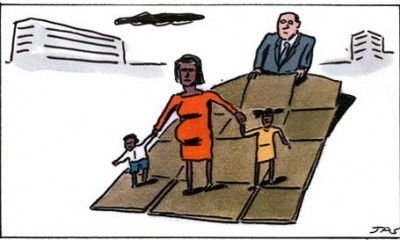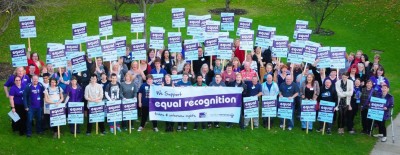Engender blog
All of Engender’s latest news. Reports, reviews, books, articles, and information from across Scotland’s women’s sector.
We would love to hear from other feminists around Scotland. Check out our guidelines for more information on how you can blog for us.
Welcome to Engender, Alys!
Alys has joined Engender as our new Communications and Engagement Officer, where she’ll be sending out mailings, running events, and making sure you’re up to speed with everything that’s happening in the wonderful world of gender equality campaigning! Before joining Engender she worked with Jubilee Scotland on the campaign to cancel global debt and at People & Planet helping students campaign against climate change. She studied at Cardiff University, where she was women’s officer at the student union, and is excited to be getting her teeth back into feminist campaigning again! You can contact Alys to chat about anything to do with her role.
We’re also excited to welcome our new officers who will guide our board of trustees and support the staff team; Nina Murray is our new Convener, Emily Thomson is taking on the role of Vice Convener and we’re delighted that Wendy Davies is staying on as our Treasurer and Company Secretary. You can read more about all of Engender’s board members on our website.
Smith Commission agreement a mixed bag for women
 The Smith Commission report was launched this morning with some fanfare and warm words for both the 'sagacious' stewardship of Lord Smith of Kelvin and the National Museum of Scotland, which hosted the affair.
The Smith Commission report was launched this morning with some fanfare and warm words for both the 'sagacious' stewardship of Lord Smith of Kelvin and the National Museum of Scotland, which hosted the affair.
The devolution of income tax was the part of the agreement most heavily trailed in the media, but we were particularly keen to see whether the five parties had met ours and others' calls for specific powers to redress inequalities.
We called for the Scottish Parliament to have the powers:
- To legislate and regulate around equality law, including the power to establish a Scotland-specific equalities regulator, akin to the Equality Commission in Northern Ireland.
- To legislate and regulate around employment, including around maternity, paternity and parental leave; flexible working; the national minimum wage; and the employment tribunal service.
- The social security, benefits and taxation system, including the power to legislate and regulate, in addition to administration and deliver.
- To establish employability programmes that link with Scotland’s economic development strategy to be devolved to the Scottish Parliament.
- To regulate broadcasting and advertising in Scotland.
- The administration of all reserved tribunals operating in Scotland, including the Immigration and Asylum Tribunal should be devolved.
Scottish Labour leadership contest: Q&A with Engender

Voting for the Scottish Labour Party’s new leader is now underway, with the result to be announced on the 13th December. Until then, candidates will continue to put forward distinct visions for their party, in the context of a packed political calendar over the next 18 months. Whatever is pledged during this campaign will immediately be tested in the form of two parliamentary elections. It is a fascinating time for Scottish politics and this contest plays no small part in the post-referendum settling of dust.
It is also fascinating that gender issues have been included in the public debate this time around. At a themed hustings at Scottish Labour’s annual women’s conference last weekend, all five candidates for leader and deputy leader spoke on a range of issues, including the pay gap, equal representation and abortion rights. Ahead of this, the two forerunners for leader, Jim Murphy and Neil Findlay, published informal proposals to tackle gender inequality. Findlay's include tackling the gender pay gap, whilst Murphy's focus on equal representation at cabinet level and on public boards.
‘Welfare’ and women: an update
 Last week, George Osborne announced that the Treasury will start publishing annual breakdowns of public tax spend per head, in a move that will apparently increase transparency for taxpayers.
Last week, George Osborne announced that the Treasury will start publishing annual breakdowns of public tax spend per head, in a move that will apparently increase transparency for taxpayers.
Cue rounds of analysis raising bones of contention online. It is in no way surprising that ‘welfare’ has been at the heart of debate, with many commentators quick to point out that our esteemed HMT has chosen to chunk up the data such that ‘welfare’ spending is represented extremely misleadingly indeed.
Guest Post: Trans and intersex equality voice grows louder as largest conference in Scotland is held
By James Morton

From Friday 31 Oct to Sunday 2 Nov, Scotland held its largest transgender and intersex equality conference with over 250 people participating. The Trans and Intersex Conference of the Isles took place in Edinburgh and was organised by the Scottish Transgender Alliance and Equality Network thanks to funding from VisitScotland, the Scottish Government and the University of Edinburgh.
Downloads
 Engender Briefing: Pension Credit Entitlement Changes
From 15 May 2019, new changes will be introduced which will require couples where one partner has reached state pension age and one has not (‘mixed age couples’) to claim universal credit (UC) instead of Pension Credit.
Engender Briefing: Pension Credit Entitlement Changes
From 15 May 2019, new changes will be introduced which will require couples where one partner has reached state pension age and one has not (‘mixed age couples’) to claim universal credit (UC) instead of Pension Credit.
 Engender Parliamentary Briefing: Condemnation of Misogyny, Racism, Harassment and Sexism
Engender welcomes this Scottish Parliament Debate on Condemnation of Misogyny, Racism, Harassment and Sexism and the opportunity to raise awareness of the ways in which women in Scotland’s inequality contributes to gender-based violence.
Engender Parliamentary Briefing: Condemnation of Misogyny, Racism, Harassment and Sexism
Engender welcomes this Scottish Parliament Debate on Condemnation of Misogyny, Racism, Harassment and Sexism and the opportunity to raise awareness of the ways in which women in Scotland’s inequality contributes to gender-based violence.
 Gender Matters in Social Security: Individual Payments of Universal Credit
A paper calling on the Scottish Government to automatically split payments of Universal Credit between couples, once this power is devolved to the Scottish Parliament.
Gender Matters in Social Security: Individual Payments of Universal Credit
A paper calling on the Scottish Government to automatically split payments of Universal Credit between couples, once this power is devolved to the Scottish Parliament.
 Gender Matters Manifesto: Twenty for 2016
This manifesto sets out measures that, with political will, can be taken over the next parliamentary term in pursuit of these goals.
Gender Matters Manifesto: Twenty for 2016
This manifesto sets out measures that, with political will, can be taken over the next parliamentary term in pursuit of these goals.
 Scottish NGO Briefing for UN Special Rapporteur on Violence Against Women
Joint briefing paper for the UN Rapporteur on Violence Against Women.
Scottish NGO Briefing for UN Special Rapporteur on Violence Against Women
Joint briefing paper for the UN Rapporteur on Violence Against Women.

Newsletter
Sign up to receive our newsletter here:
Sign up to our mailing list
Receive key feminist updates direct to your inbox: